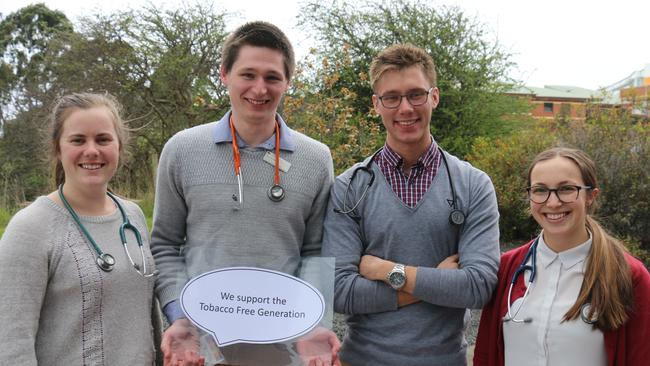World tobacco experts in Hobart to stamp out smoking
Creating everything from smoke-free apartment blocks to cities and islands will be on the agenda when tobacco control experts descend on Hobart this week.

Tasmania
Don't miss out on the headlines from Tasmania. Followed categories will be added to My News.
CREATING everything from smoke-free apartment blocks to cities and islands will be on the agenda when hundreds of tobacco-control experts descend on Hobart for an international conference this week.
It is the first time Hobart has hosted the Oceania Tobacco Control Conference, which is bringing together 320 participants discussing the theme: “From vision to reality: A tobacco-free Oceania”.
Organising committee chairwoman Penny Egan, who is also CEO of Cancer Council Tasmania, said the conference would be a chance for stakeholders, government and anti-smoking advocates to get a picture of what is happening internationally in the area of tobacco control.
“In Oceania, we truly believe that our vision is not aspirational but must become an achievable reality,” she said.
One of the topics up for discussion, put forward by the NSW Cancer Council, will look at the development of strata bylaws and social media campaigns to encourage smoke-free apartment blocks.
Cancer Council NSW is helping residents of apartment blocks advocate for the adoption of smoke-free bylaws.
Ms Egan said the creation of smoke-free living had become a big issue in cities with a lot of medium-density living. “I suspect we will see some change in this space and people will be making decisions on where they choose to live because of these issues,” she said.
Speakers from around the region will address the conference on the path towards creating smoke-free cities in New Zealand and a smoke-free Cook Islands.
The conference comes as a group of University of Tasmania final-year medical students endorse the concept of a Tobacco Free Generation in Tasmania.
The group of 20 students, from the Rural Medical School, have been speaking about tobacco-related health issues in schools and are urging policy-makers to ban the sale of cigarettes to Tasmanians born after a certain year.
Medical student Olivia Chung, 22, said it was important to prevent young people from taking up smoking because it was harder for them to understand the devastating effects on their health.
“Smoking is one of the main risk factors for preventable diseases — cardiovascular disease, some cancers and diabetes,” said Ms Chung, who is due to graduate later this year.
“If we can stop young people taking up the highly addictive habit, we can effectively avoid a lot of preventable disease in the future,” she said.
The students have applauded moves by Windermere MLC and anti-tobacco campaigner Ivan Dean, who has proposed legislative amendments to ban the sale of cigarettes to anyone born after 2000. The Bill is still before the Upper House, awaiting further debate.
Nick Towle, a senior lecturer in medicine, said the students’ learning about rural medicine had reinforced their concerns about tobacco.
“Smoking disproportionately affects those in rural and regional areas,” Dr Towle said.
He said that Tasmania, as an island with clear borders and strong tobacco licensing schemes, was well positioned to create a “generational firebreak” by choosing a “lucky generation” which would not be able to buy tobacco.
Mr Dean said he remained hopeful Tasmania would lead Australia in drawing a line in the sand on tobacco.
“We are doing a lot of work and there seems to be a change of attitude among many … I’m very hopeful this will happen,” he said.
Mr Dean said there would need to be adequate lead-in time for a Tobacco Free Generation, so the idea of a generation born from 2000 being smoke-free might have to be revised to those born from 2002 or 2003.
He said reforms were afoot around the world, and he was buoyed by a recent decision for Balanga City, in the Philippines, to legislate to implement the tobacco-free generation idea from next year for those born after 2000.
“Change is happening — like it or not, people have to accept that there has to be an end game to smoking and that’s the way we have to go.”
Public health academic Kathryn Barnsley, of SmokeFree Tasmania, said the Tobacco Free Generation idea had attracted interest from an anti-cancer group funded by billionaire iron ore magnate and philanthropist Andrew “Twiggy” Forrest.
Mr Forrest’s Minderoo Foundation, which is running a $75 million “Eliminate Cancer Initiative”, plans to meet Mr Dean and SmokeFree Tasmania in coming weeks.
The legal smoking age would be lifted to 21 in Australia under Mr Forrest’s anti-cancer plan.
The Tasmanian Government last year backed away from a proposal to increase the minimum legal smoking age in Tasmania to 21 or 25. Dr Barnsley said Tasmania could save $1 billion over a 20-year period if smoking was reduced by 10 per cent by 2020.
Data from Cancer Council Tasmania shows smoking is the leading preventable cause of death and disease in Tasmania, with 425 deaths attributed to smoking in 2013-14.
The council says smoking cost Tasmanian society an estimated $465 million a year, including healthcare costs and loss of productivity due to the reduction in the workforce.
anne.mather@news.com.au


